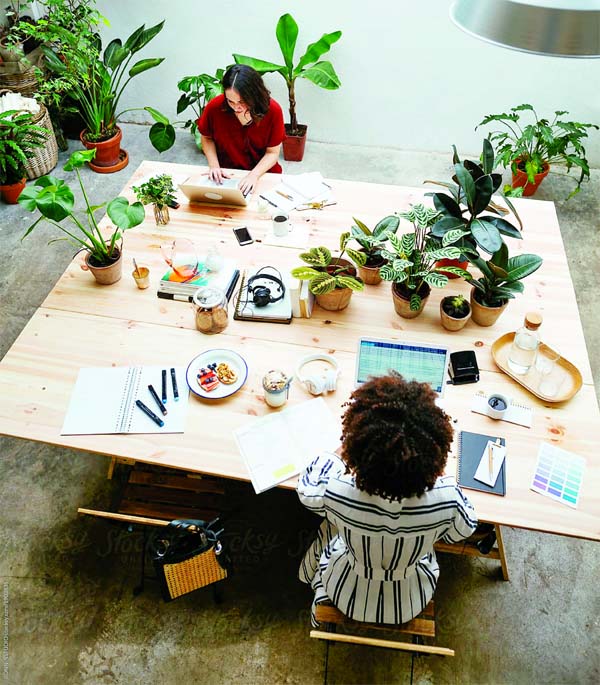
Weekend Plus Desk :
People who often feel stressed in office, please take note. Researchers have found that small plants situated within easy viewing at your workplace linked to various stress-reducing benefits.
For the study, published in the journal HortTechnology, the research team explored the practical use of indoor plants to boost mental health among employees typically removed from exposure to healthy green environments.
“At present, not so many people fully understand and utilise the benefit of stress recovery brought by plants in the workplace, said study researcher Masahiro Toyoda from University of Hyogo in Japan. To ameliorate such situations, we decided it essential to verify and provide scientific evidence for the stress restorative effect by nearby plants in a real office setting,” Toyoda said.
For the findings, the research team investigated changes in psychological and physiological stress before and after placing a plant on the workers’ desks. Sixty-three office workers in Japan were the participants of this study.
The participants were directed to take a 3-minute rest while sitting at their desks when they felt fatigue.
There were two phases of the study: a control period without plants and an intervention period when the participants were able to see and care for a small plant.
The researchers measured psychological stress in the participants using the State-Trait Anxiety Inventory.
The ratio of the participants whose pulse rate lowered significantly after a 3-minute rest with interaction with their desk plant proved definitive.
The objective of this study was to verify the stress-reducing effect of gazing intentionally at a plant in a real office setting when a worker felt fatigue during office hours.
Each plant used in the study was chosen and cared for by the worker. Both passive and active involvement with plants in the workplace was considered for their contribution to mitigation of stress and fatigue.
Participants were provided routine visual access to plants by having their choice of plant situated conveniently on their desks (a passive involvement with plants). They also had the opportunity to care for their plant (an active involvement with plants).
Furthermore, the researchers considered that intentionally gazing at the plant was, though not involving physical movement, an active interaction with plants that office workers could do quickly and easily at their desks.
Participants were offered a choice of six different types of plants to keep on their desks: air plants, bonsai plants, san pedro cactus, foliage plants, kokedama, or echeveria.
Each participant chose one of the six types of small indoor plants and placed it near the PC monitor on their desk.
The calming effects calculated during the study showed that anxiety decreased significantly from pre- to post-intervention.
The study suggests that placing small plants within close sight contributed to psychological stress reduction across the board.
The researchers suggest for business owners that small indoor plants could be economical and helpful in efforts improve office conditions for employees.
People who often feel stressed in office, please take note. Researchers have found that small plants situated within easy viewing at your workplace linked to various stress-reducing benefits.
For the study, published in the journal HortTechnology, the research team explored the practical use of indoor plants to boost mental health among employees typically removed from exposure to healthy green environments.
“At present, not so many people fully understand and utilise the benefit of stress recovery brought by plants in the workplace, said study researcher Masahiro Toyoda from University of Hyogo in Japan. To ameliorate such situations, we decided it essential to verify and provide scientific evidence for the stress restorative effect by nearby plants in a real office setting,” Toyoda said.
For the findings, the research team investigated changes in psychological and physiological stress before and after placing a plant on the workers’ desks. Sixty-three office workers in Japan were the participants of this study.
The participants were directed to take a 3-minute rest while sitting at their desks when they felt fatigue.
There were two phases of the study: a control period without plants and an intervention period when the participants were able to see and care for a small plant.
The researchers measured psychological stress in the participants using the State-Trait Anxiety Inventory.
The ratio of the participants whose pulse rate lowered significantly after a 3-minute rest with interaction with their desk plant proved definitive.
The objective of this study was to verify the stress-reducing effect of gazing intentionally at a plant in a real office setting when a worker felt fatigue during office hours.
Each plant used in the study was chosen and cared for by the worker. Both passive and active involvement with plants in the workplace was considered for their contribution to mitigation of stress and fatigue.
Participants were provided routine visual access to plants by having their choice of plant situated conveniently on their desks (a passive involvement with plants). They also had the opportunity to care for their plant (an active involvement with plants).
Furthermore, the researchers considered that intentionally gazing at the plant was, though not involving physical movement, an active interaction with plants that office workers could do quickly and easily at their desks.
Participants were offered a choice of six different types of plants to keep on their desks: air plants, bonsai plants, san pedro cactus, foliage plants, kokedama, or echeveria.
Each participant chose one of the six types of small indoor plants and placed it near the PC monitor on their desk.
The calming effects calculated during the study showed that anxiety decreased significantly from pre- to post-intervention.
The study suggests that placing small plants within close sight contributed to psychological stress reduction across the board.
The researchers suggest for business owners that small indoor plants could be economical and helpful in efforts improve office conditions for employees.

